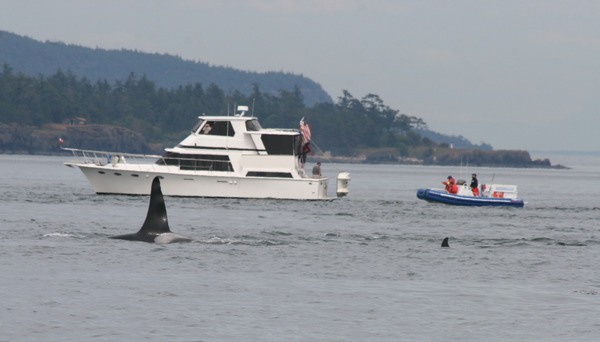Local islanders at Lime Kiln State Park watched from the shore as a kayaker got out of his craft, put on snorkel gear and got into the water when orcas were nearby June 7. According to the Marine Mammal Protection Act, there are civil penalties up to $11,000 and other repercussions for feeding, harassing, or approaching orca whales within 200 yards.
A similar occurrence happened in Kitsap County, June 12, when residents called 911 to report boats and personal watercraft getting too close to orcas in Dyes Inlet.
Federal regulations dictate that boats and water crafts keep out of whales’ path by at least 400 yards.
The regulations reflect the orcas’ endangered status, and the understanding that vessels have a big impact on orcas, including their ability to hunt and communicate if boats come too close.
“I think in general people are very receptive once you explain why the rules are there,” said Elizabeth Seely, program coordinator of Soundwatch Boater Education Program. “When you explain the impact that people have on the whales, they’re really receptive to following the federal regulations. They want to do what they can to be able to enjoy them.”
Soundwatch is made up of a crew and volunteers who go out on the water during the summer and educate recreational boaters on the rules and regulations, as well as guidelines of the area.
According to Seely, voluntary guidelines in San Juan County include a 1/4 mile distance from shore no-go zone on the west side from Mitchell Point to Eagle Point, and a 1/2 mile no-go zone at Lime Kiln State Park, where whales are often seen.
While out on the water, Soundwatch hands out Be Whale Wise guidelines to inform people on safe distances and practices to observe whales, as well as other marine wildlife like porpoises, sea lions and seals. Other practices can be slowing down when within 400 yards, approaching or departing from the side of their path, not approaching in front of or behind the pod, and stopping if whales are unexpectedly within 100 yards of the boat.
“The regulations are to give enough distance and space to give them what they need to do,” said Jenny Atkinson of the Whale Museum. “I think people by and large want to do right. But people do get excited and they want to go closer.”
Seely recommends generally keeping an eye out for wildlife of all kinds to reduce the amount of stress put on wildlife by getting too close or being too loud.
Soundwatch will be holding a fundraiser at Mike’s Wine & Café Bar June 26 for vessel repair and maintenance with food, drinks, and raffle prizes. 6:30 p.m., for more information call 360-378-4710 ext. 30.




